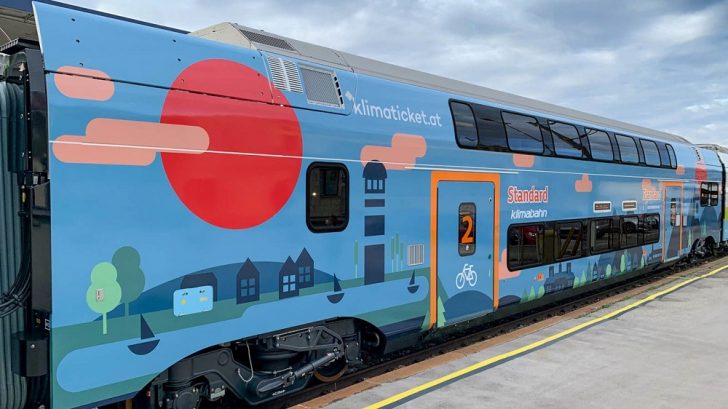Austria has taken a bold step to combat climate change by introducing the “KlimaTicket” in October 2021. This nationwide climate ticket is a game-changer, offering nearly unlimited access to public transportation nationwide with just one ticket, valid for a full year.
The goal? To drastically reduce private car usage, cutting it down by 16% by 2040. This initiative is part of Austria’s plan to shift from car-dependent individual transportation systems to eco-friendly alternatives. Let’s dive into the details of this innovative approach.
Challenging Carbon Emissions in Austria
Austria faced a substantial challenge in 2019 when transport-related greenhouse gas emissions accounted for 39.8% of the country’s total CO2 emissions, well above the OECD average of 24%. The primary culprit was road transport, which contributed to almost all of Austria’s transport-related emissions.

Given its land-locked geography, Austria desperately needed a sustainable solution to curb emissions from the transport sector. In response, the Austrian government decided to champion public transport as a greener alternative to private vehicles and invested heavily in improving the public transportation infrastructure.
According to Austria’s 2030 Mobility Master Plan, the country has set ambitious targets. They aim to reduce private car usage by 16% by 2040 while simultaneously increasing the share of public transport from 27% to 40% and doubling active modes of travel, such as walking and cycling, from 3% to 6%.
Despite these goals, the number of registered cars in Austria has steadily risen over the past few decades, reaching approximately 5 million in 2019, compared to less than 3 million in 1990.
The Innovative Approach
On October 26, 2021, also the Austrian National Day, the nation introduced the groundbreaking “KlimaTicket.” This climate ticket provides nearly unrestricted access to public transportation throughout Austria for an entire year.
It’s priced at EUR 1,095 per year for adults (equivalent to just EUR 3 per day) and EUR 821 for youths and seniors. Additionally, there’s a family ticket option. The KlimaTicket aims to simplify and make mobility more affordable, emphasizing the importance of a streamlined ticketing system.

This initiative clearly indicates Austria’s commitment to achieving the goals set in the Paris Agreement. The government’s message is simple: the more people embrace the KlimaTicket, the more significant the positive impact on the climate.
Alongside promoting the KlimaTicket, the federal government has also invested in infrastructure development and the digitalization of services to make public transportation even more attractive. This includes expanding the number of trains on key routes, modernizing the train fleet, and offering more night trains.
Results and Impact
The KlimaTicket has exceeded expectations, attracting over 130,000 subscribers in its first two months. By the end of June 2022, 170,000 tickets had been purchased, with youths and seniors accounting for 28% and 13% of ticket holders, respectively.
The comprehensiveness of the KlimaTicket, covering all modes of public transport across the country, has made it incredibly accessible and economical for users.

One of the most encouraging outcomes of the KlimaTicket is its effect on people’s behavior. Surprisingly, even though most subscribers possess a driver’s license, approximately two-thirds have reported using public transport more frequently.
Even more impressive is that 85% have already replaced some car journeys with public transportation. It’s worth noting that while it’s too early to make a comprehensive assessment of the KlimaTicket’s impact and cost-effectiveness, the Austrian government has expressed a strong commitment to continue the initiative.
This underscores their determination to decarbonize the transport sector, making the KlimaTicket a cornerstone of Austria’s journey towards net-zero transport.




